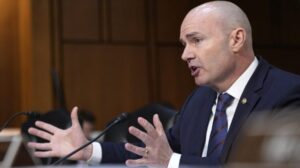Congress
Dead lawmakers tweet from beyond the grave
After Zohran Mamdani’s apparent victory in the New York Democratic mayoral primary on Tuesday, former Rep. Sheila Jackson Lee (D-Texas) liked an Instagram post congratulating him on his win.
The only problem — Jackson Lee died last July.
From ghost-likes and new profile pictures to a posthumous endorsement, accounts for dead lawmakers have seemingly resurrected on social media in an unsettling trend of beyond-the-grave engagement.
“Dear White Staffers,” an anonymous account dedicated to highlighting experiences and perspectives of non-white congressional staffers, on Wednesday posted a screenshot of a notification that the late Texas representative’s account had liked the congratulatory post for Mamdani, captioning the screengrab with a quizzical emoji.
But Jackson Lee isn’t the only deceased lawmaker whose presence continues to be felt online.
Rep. Sylvester Turner, a Democrat who filled Lee’s Texas seat for a brief two months before his own passing in March 2025, appeared to change his profile picture on X three weeks after he died.
“Happy #OpeningDay!” Turner’s personal account posted on MLB Opening Day, adding the hashtag “NewProfilePic” along with a photo of the late lawmaker holding a baseball. A community guidelines note affixed by X to the post noted that “Sylvester Turner died on March 5, 2025.”
The post appeared to shock many X users, who commented on how uncanny it was to see the deceased lawmaker active on their feeds. “Grim,” one user wrote, while another asked: “So no one on his team thinks this is weird?”
Former Rep. Gerry Connolly, a Virginia Democrat who died in May, has also continued to make waves from beyond the grave, as his political social media accounts chugged back to life to notify followers that early voting had begun in the race to fill his vacant seat. Before his passing, Connolly had endorsed his former chief of staff, James Walkinshaw, to replace him, having announced that he planned to step away from Congress after his esophageal cancer returned in April.
People on Connolly’s mailing list have also reportedly continued receiving emails from the late representative’s campaign encouraging Virginians to vote for Walkinshaw in Saturday’s special election, the newsletter Chaotic Era highlighted — and directing donations to Walkinshaw’s campaign.
But after Connolly’s posthumous post came under scrutiny this week, it disappeared from the late Virginian’s page on Thursday.
Brian Garcia, communications director for Walkinshaw’s campaign, emphasized that the campaign does not direct the content posted from Connolly’s accounts. “Supervisor Walkinshaw is proud to have earned the support of Congressman Connolly before he passed away and to now have the support of the Connolly family,” he said.
The bio for Connolly’s page notes that the lawmaker died in May, and says that posts on the page are made with Connolly’s family’s consent. Turner’s account also appears to be run by his family, with the account recently posting a video featuring his daughter promoting a Houston parade he championed.
But the case of posthumous tweeting fingers isn’t a new phenomenon.
An account for political activist, brief 2012 GOP presidential primary leader and staunch Trump supporter Herman Cain resurfaced two weeks after he died in July 2020 from a weekslong battle with Covid-19. The account posted attacks at then-presidential candidate Joe Biden and pro-Trump content — as well as conspiracy theories about the virus that had taken Cain’s own life.
The posts initially appeared under Cain’s original account, bearing his name and profile picture. But his daughter shortly thereafter explained in a blog post that members of his family had taken over his social media presence and would continue posting under the new name “Cain Gang.”
The account remained active until March 2021, when it released its final post, saying “It’s time.”
How to handle the social media presence of politicians when they die is a fairly new phenomenon. If a member of the House dies, for example, their office often remains open to fulfill constituent services — and sometimes continues posting to social media, albeit not typically under the lawmaker’s name. And there’s even less clarity around lawmakers’ social media accounts that they use for campaigning, as opposed to official work.
Zack Brown, who was the communications director for Rep. Don Young (R-Alaska) when he died in office in March 2022, said there is no official process for handing off control of lawmakers’ social media accounts if they die while still serving. That leaves communications staff in an awkward bind on how to proceed with languishing accounts, he said.
Although there were content rules on what staff members were allowed to post to Young’s accounts — political, policy-related and ideological posts were off-limits — there was no guidance on what to do with the accounts themselves.
“When a member of Congress dies, nobody seems to care about getting the log-ins from you, or assuming control of the Facebook page,” Brown said. “I still, if I wanted to, could go post to Facebook as Congressman Young — I could still tweet today as Congressman Young. And nobody from archives or records or from House administration, or anybody, seems to give a shit.”
Brown continued serving in the Alaskan’s office for four months after his death, administering the affairs of the office and helping wind down its operations to prepare for Young’s replacement after the special election.
While the process of physically closing down Young’s office was “meticulous,” with individual files and knickknacks from the lawmaker’s office requiring logging, the “digital aspect of it was completely ignored,” Brown said.
Brown noted that failing to properly administer a lawmaker’s social media presence is also a constituent services issue, as many people reach out to their representative’s offices via direct message for assistance.
But most of all, Brown cautioned, a lack of procedure for how to handle dead lawmaker’s’ socials poses a host of security risks that would normally be unthinkable for physical record-keeping.
“I can’t walk into the National Archives right now and just go behind closed doors and take whatever files from Congressman Young that I want,” Brown said. “Why does somebody who had social media access have that power to do that with tweets?”
Nicholas Wu contributed to this report.
Congress
‘Kill shot’: GOP megabill targets solar, wind projects with new tax
Senate Republicans stepped up their attacks on U.S. solar and wind energy projects by quietly adding a provision to their megabill that would penalize future developments with a new tax.
That new tax measure was tucked into the more than 900-page document released late Friday that also would sharply cut the tax credits in the Inflation Reduction Act for solar and wind projects. Those cuts to the IRA credits were added after a late-stage push by President Donald Trump to crack down further on the incentives by requiring generation projects be placed in service by the end of 2027 to qualify.
The new excise tax is another blow to the fastest-growing sources of power production in the United States, and would be a massive setback to the wind and solar energy industries since it would apply even to projects not receiving any credits.
“It’s a kill shot. This new excise tax on wind and solar is designed to fully kill the industry,” said Adrian Deveny, founder and president of policy advisory firm Climate Vision, who helped craft the climate law as a former policy director for Democratic Senate Leader Chuck Schumer.
Analysts at the Rhodium Group said in an email the new tax would push up the costs of wind and solar projects by 10 to 20 percent — on top of the cost increases from losing the credits.
“Combined with the likely onerous administrative reporting burden this provision puts in place, these cost increases will lead to even lower wind and solar installations. The impacts of this tax would also flow through to consumers in the form of higher electricity rates,” Rhodium said.
The provision as written appears to add an additional tax for any wind and solar project placed into service after 2027 — when its eligibility for the investment and production tax credits ends — if a certain percentage of the value of the project’s components are sourced from prohibited foreign entities, like China. It would apply to all projects that began construction after June 16 of this year.
The language would require wind and solar projects, even those not receiving credits, to navigate complex and potentially unworkable requirements that prohibit sourcing from foreign entities of concern — a move designed to promote domestic production and crack down on Chinese materials.
In keeping with GOP support for the fossil fuel industry, the updated bill creates a new production tax credit for metallurgical coal, which is used in steelmaking.
Congress
Elon Musk renews megabill attacks
Elon Musk is once again bashing the Republican megabill.
Weeks after an initial tirade against the legislation, the former top White House staffer and current richest man in the world wrote Saturday on X that the “latest Senate draft bill will destroy millions of jobs in America and cause immense strategic harm to our country!”
“Utterly insane and destructive,” he added. “It gives handouts to industries of the past while severely damaging industries of the future.”
The bill significantly cuts subsidies for clean power sources like wind and solar, along with tax credits for buying electric vehicles and instead includes incentives for the coal industry.
Musk has intervened before to tank a major spending bill. The billionaire torpedoed a compromise government spending bill in December by repeatedly posting in opposition to it. This caused a number of Republicans to back away and nearly spaked a government shutdown.
At the time, Musk had far more influence as a close Trump ally and as the largest donor in support of Trump’s re-election bid. His influence in the GOP has waned after his controversial stint atop the Department of Government Efficiency initiative created repeated hassles for the White House.
Congress
House could vote on megabill as soon as Tuesday
House Majority Leader Steve Scalise told GOP members on a Saturday conference call to prepare for votes Tuesday evening or Wednesday on the sweeping Republican megabill, according to three people who were on the call and were granted anonymity to describe it.
Scalise and Speaker Mike Johnson addressed House Republicans as GOP leaders in the Senate raced to tweak and advance their version of the megabill. Johnson said on the call he has been working with Senate Republican leaders to shape the bill so the version that emerges from the other chamber can be passed in the House without changes and sent to President Donald Trump for enactment.
The leaders have been planning to iron out some issues in a final amendment before Senate passage, but Senate GOP leaders have pushed back hard on reversing deep Medicaid cuts — something dozens of House Republicans are concerned about.
Johnson also members to bring any remaining concerns directly to their GOP senators and to the White House — and to not air those grievances in public. House GOP leadership said they would stick with a promise to give members 48 hours notice of a vote so that lawmakers have adequate time to return to Washington.
House GOP leaders did not take questions on the call.
-

 The Josh Fourrier Show8 months ago
The Josh Fourrier Show8 months agoDOOMSDAY: Trump won, now what?
-
Uncategorized8 months ago
Bob Good to step down as Freedom Caucus chair this week
-

 Politics8 months ago
Politics8 months agoWhat 7 political experts will be watching at Tuesday’s debate
-

 Politics8 months ago
Politics8 months agoHow Republicans could foil Harris’ Supreme Court plans if she’s elected
-
Economy8 months ago
Fed moves to protect weakening job market with bold rate cut
-
Economy8 months ago
It’s still the economy: What TV ads tell us about each campaign’s closing message
-

 Politics8 months ago
Politics8 months agoRFK Jr.’s bid to take himself off swing state ballots may scramble mail-in voting
-
Uncategorized8 months ago
Johnson plans to bring House GOP short-term spending measure to House floor Wednesday








